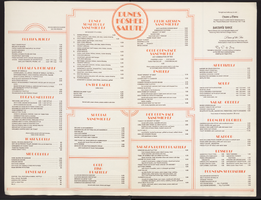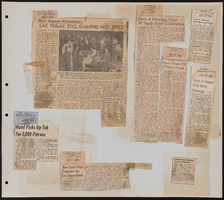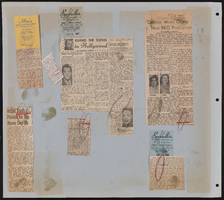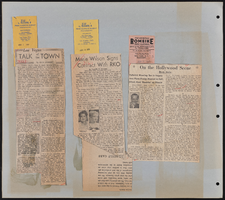Search the Special Collections and Archives Portal
Search Results

Transcript of interview with Richard Leigon by Stefani Evans and Claytee White, January 12, 2017
Date
Archival Collection
Description
The first part of this Shakespearean quote perfectly describes the deep admiration and love that Richard Leigon has for his father, International Brotherhood of Electrical Workers (IBEW) leader Ralph Leigon. The elder Leigon's major contributions include 39 various positions from the Nevada State American Federation of Labor and Congress of Industrial Organizations (AFL-CIO), Nevada State Democratic Party, and the Southern Nevada Building Trades Council. Richard speaks upon the early years of Las Vegas with the allure of atomic testing, going to school with future community leaders Jerome Mack, Shelley (Levine) Berkeley, and Beth Molasky as well as the role of the union in building Las Vegas. After graduating from Las Vegas High School, he attended Somona State University and obtained a degree in humanistic psychology where he furthered his father’s influence on becoming a ‘we’ person. He came back to Las Vegas to start his 40-year career as an active member of Local 357 as executive
Text
Breck Wall Photograph Collection
Identifier
Abstract
The Breck Wall Photograph Collection, approximately 1960 to 1980, consists of black-and-white photographic prints depicting comedian and entertainer, Breck Wall, and other cast members of the comedy revue, “Bottom’s Up!” in Las Vegas, Nevada. Images include scenes from sketches performed on the show, group shots of the cast members off-set, and portraits of Wall.
Archival Collection
Antonio Morelli Photograph Collection
Identifier
Abstract
The Antonio Morelli Photograph Collection documents the professional and private life of the Sands Hotel Orchestra conductor, Antonio Morelli, from 1932 to approximately 1970. The majority of the photographs show events, Copa Room showgirls, and the orchestra at the Sands Hotel and Casino in Las Vegas, Nevada during the 1950s and 1960s. Subjects depicted in the photographs include a Copa girl with an atomic bomb crown, Joe W. Brown's Horseshoe million dollar display at Binion's Hotel and Casino, and Antonio Morelli performing with Jimmy Durante and Carl Cohen.
Archival Collection

Transcript of interview with John Erb by Susan Korzennik, February 23, 1980
Date
Archival Collection
Description
On February 23, 1980, Susan Korzennik interviewed construction worker John Erb (born on July 16th, 1932 in Denver, Colorado) in his home in Las Vegas, Nevada. This interview covers John’s construction work in the Las Vegas area in addition to family life in Nevada and local social, religious, and community activities. He also discusses being a member of the Elks Club and the Clark County Gentlemen’s Club.
Text






